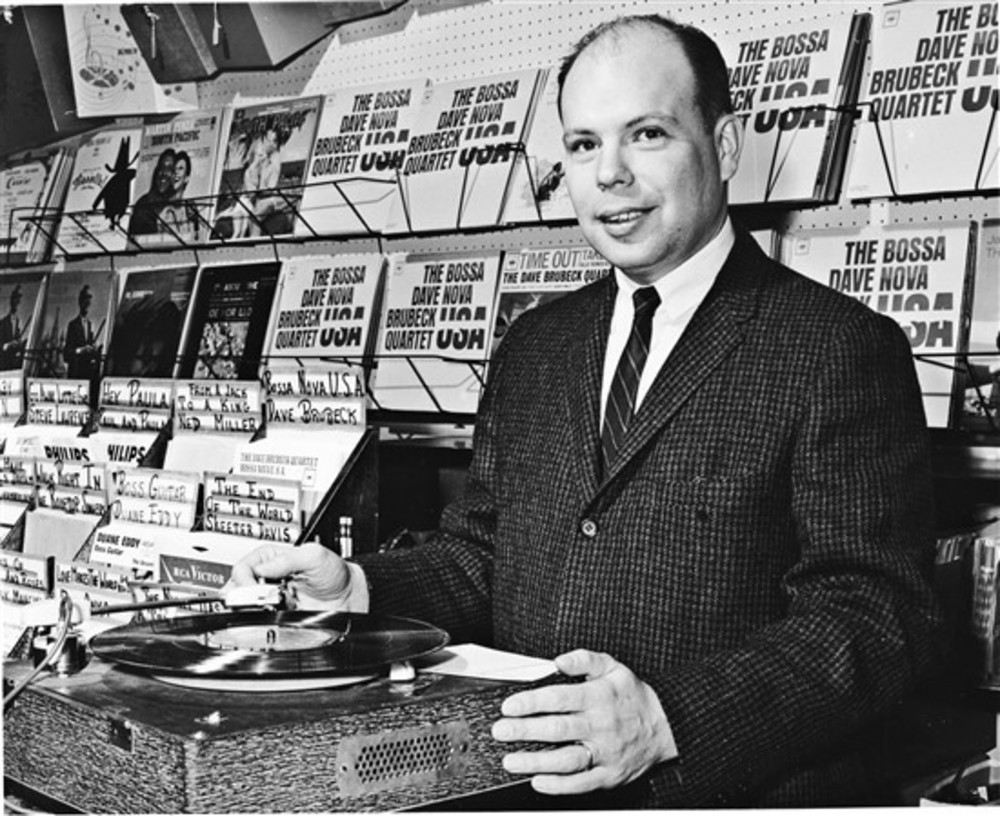Music, Music, Music
 Seymour Ladd in one of his record shops.
Seymour Ladd in one of his record shops.
When we moved to Rhode Island in 1936, we lived for a time with my Uncle Shaya, who owned a tall lacquered cabinet, strictly off limits to me. It housed his Victrola.
To operate this amazing (to me) device, you had to insert a crank into a niche on the side and rotate it until it could turn no more. Next came the tricky part. You had to carefully place the stylus on the outer groove of the spinning disc. Missing the mark could send the stylus skittering across the record, causing irreparable scratches or even dooming it to the dustbin. Electrolas, or electric phonographs, were available then, but this was the Depression. Use it up, wear it out, only then replace it was the order of the day. Besides, why add to the electric bill?
I was in high school before I became aware that music other than classical or cantorial could be found on records at shops like Les Brown’s (later renamed Beacon Records) owned by Milton and Ruth Israeloff. After World War II, Ray Muffs opened Muffet’s Music in downcity, which became the “go-to” place for hard-to-find records and albums.
These memories came to the fore after an interview with Seymour Ladd. Before his retirement, he owned the first chain of record shops in Rhode Island, promoted musical performances and managed performers. Along the way, he also initiated the first ticket agency for events in local venues large and small.
Ladd, who plays the clarinet, entered the music business after a stint as a theater manager and rack jobber. He got a taste of the record business while working at Muffet’s and decided to open his own shop.
The years following World War II saw the beginning of the boom in record collecting. “It was,” Ladd said, “a time of transition.” Vinyl records replaced the heavier “shellacs.” The long-playing 33 would soon appear. Of particular appeal to teens were the singles recordings on 45s, 59 cents each, which could be played on a small phonograph built specifically for that size record, an ideal fit for a teen’s bedroom. The new hobby of collecting records caught fire.
Ladd opened his first record shop, Cranston Music Center, Feb. 18, 1954, four months to the day after he and Shirley were married. Cranston, he felt, was an underserved area. The shop was located on Park Avenue across the street from Cranston High School (now Cranston High School East).
Ladd’s shop did not have the glass-enclosed listening booths, into which, according to an urban legend, half a dozen teens would squeeze to listen to records. By that time the booths were passé.
“When school let out,” Ladd stated, “the kids made a beeline for Cranston Music Center. The store was loaded. They did not have cars to take them away immediately. Not all were paying customers, but they had a good time listening to the music I played for them. They were mostly polite.” He also dealt a great deal with mentally and physically challenged groups. They came by special transport ostensibly to buy records, but mainly to listen. He enjoyed complying with their requests for songs because they enjoyed the music so much. By 1973, Ladd had relocated the Music Center to Garden City in Cranston and opened Ladd’s Music on the East Side of Providence, in East Providence and in Wakefield.
Looking back on his experience, Ladd said before he entered business, he was still playing the clarinet and was interested in music of all sorts. His friend Cantor Karl Kritz had a radio program – the Jewish Hour – on WRIB. “He and I sold the advertising and got the music together: some klezmer, some Yiddish pop songs, some cantorial. Klezmer is still a favorite of mine.” They also began promoting live performances.
The first was a benefit for Hebrew Day School in 1953 at Veteran’s Auditorium featured the famed tenor Jan Peerce. It was a prelude to his later enterprise, beginning in 1963, that brought big band music and celebrity musicians to venues like Loew’s (now Providence Performing Arts Center), the Albee Theatre and Rhodes-on-the-Pawtuxet.
Ladd closed his last store in 2003, a small shop in Warwick filled with records and cassette tapes that no longer attracted many customers. Newer ways of listening to music had brought about the demise of the record shop, but as the lyricist wrote: The song is ended, but the memory lingers on (lyric by Beda Loehner, music by Irving Berlin).
GERALDINE FOSTER is a past president of the Rhode Island Jewish Historical Association. To comment about this or any Rhode Island Jewish Historical Association article, email info@rijha.org







